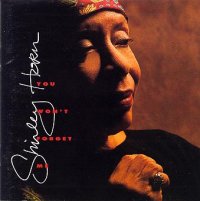
New York on Sunday
Big city's taking a nap
Slow down, it's Sunday
Life's a ball, let it fall right into your lap
Earlier I linked to the New York Times obituary of Shirley Horn, but it's the Washington Post that really has the goods, with a jazzhead's take on Horn's music by Richard Harrington.
Horn's trademark, Harrington points out, is her slowness:
Horn, who died Thursday night at 71 after a long illness, could swing a tune with the best of them, and often surprised fans when she did, but that approach simply didn't fit her temperament. Instead, Horn did ballads and cool, understated ruminations better than anyone except her first champion, mentor and lifelong friend, trumpeter Miles Davis. Both were masters of silence and anticipation, but even Davis teased Horn about her pacing. "You do 'em awful slow!" he once said.
Slowed down, Horn songs like "Here's to life" and "Beautiful love" sound strangely dissociated: as if she's musing on something personal -- but maybe a little disconnected -- as she's singing.
The Times talks about her ability to boil a song down to the bare melody, but I don't know if that's quite it. Horn sings so slow that the listener doesn't 'hold' melody in the usual way. You're not being carried by a catchy tempo, so you're always slightly off-balance, anticipating the next phrase. Slowness intensifies the drama in the song, which sometimes gets too intense (though it never crosses over into melodrama).
But Shirley Horn isn't just going for drama; she's also interested in a minimalism that does something else entirely. In the space between jazz and the blues, Horn seems to always know what her voice can do as an instrument. So she plays it distant, like a slow trumpet riff in a minor key. Her last name, one feels, cannot be an accident.
The best way to explain Shirley Horn's style is to compare her version of "Peel me a grape" to Diana Krall's. Krall is a contemporary cocktail party staple; her version "Peel me a grape" is so popular, people might not know that other versions exist. Krall does it fast and punchy, like a Cole Porter song. She announces her (impressive) vocal skills at every step -- showbiz all the way. It's as if she's saying: listen to this and be impressed! And most of the time, one walks away duly impressed.
But sometimes one wants something a little smaller and less polished. Shirley Horn does "Peel me a grape" with no Showbiz (or showmanship) in her voice. She also sings at about half-speed, and is languorous and contemplative where Krall is sharp and to-the-point. If you'll allow a dessert metaphor, Horn is no sugar added.
For all that, Diana Krall still owes something to Shirley Horn, for the song itself (if nothing else). Harrington alludes to this as well:
Horn was at times reflective, at times wry, and on occasion caustic and cantankerous. She expressed frustration with the music business, particularly that such pianist-singers as Norah Jones and Diana Krall didn't acknowledge her as the influence she clearly heard herself to be.
Of course, some of this is the usual generational snubbing, and there's also a bit of the sometimes invisible mainstream appropriation of African American music, which will be familiar to anyone who knows the history of popular music here.
You might be able to hear a little snippet of Shirley Horn's "Peel me a grape" at Amazon (sometimes it doesn't work). A sample of Diana Krall's version is here.
Shirley Horn was also on The Connection in 2002; you can listen streaming. Even as recently as three years ago, fighting cancer and some other serious physical ailments, she sounded great.